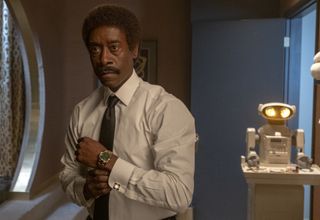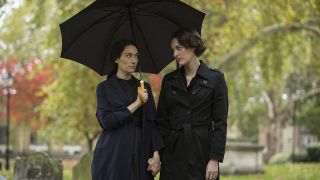In 2019, HBO Remains the Network to Beat

Why This Matters: Emmy wins have become a vital marketing tool for top networks in the jam-packed TV environment.
Without massive hits like Game of Thrones or critical darlings like Veep on its slate, premium cable network HBO — the first to smartly turn Emmy Awards wins into marketing gold — might be out of the Emmy race in future years.
But not today.
In 2019, HBO is highly likely to score Emmys in the show’s two biggest categories: outstanding drama and outstanding comedy, as well as have a fighting chance for outstanding limited series.
That dynamic begs a key question. “Are the Emmys going to reward shows in their final season or embrace new shows?” asks an awards strategist who declined to be named. The Hollywood Foreign Press Association, which backs the Golden Globes, loves to reward breakout shows, but the Emmys tend to be more about legacy.
‘GoT’ Leads Drama Pack
The final season of Game of Thrones was controversial but however the fans felt about it, it was also the most jaw-dropping season of television ever produced. From cities being burned to the ground to dragons flying overhead, Game of Thrones’ dominance at this year’s Emmys is assured. Should Game of Thrones win this year, that would mark its fourth series win, including last year’s. The epic fantasy series has been nominated every year it has been on the air.
Broadcasting & Cable Newsletter
The smarter way to stay on top of broadcasting and cable industry. Sign up below
Besides a wagon load of Creative Arts nominations — especially in the technical and VFX categories — look for Kit Harington to be nominated for lead actor, while Peter Dinklage and Nikolaj Coster-Waldau should be nominated in the supporting actor category. Harington’s performance as the brooding Jon Snow is often criticized, but he was arguably the hero at the center of TV’s biggest show.
Harington is expected to be joined in this category by Better Call Saul’s Bob Odenkirk, who might win this year after being nominated three previous times for this role; as well as fellow Thrones veteran Richard Madden, the Golden Globes winner for Netflix’s Bodyguard and Sterling K. Brown of NBC’s This Is Us, who won in this category in 2017.
Meanwhile, Dinklage — who should be competing in the lead actor category, considering his screen time in season eight — is expected to take home his fourth supporting actor Emmy for this role come September. Dinklage has been nominated in this category every year that the show has aired. Among Thrones’ women, Emilia Clarke, who played the ultimately doomed Daenerys Targaryen, should expect a nomination among the lead actresses, while Maisie Williams, whose Arya Stark evolved from tomboy to assassin over the show’s run, is a good bet in the supporting actress category. And if there is justice for Arya, the hero of Winterfell should win. She is expected to face strong competition from her co-stars, Lena Headey (Cersei Lannister) and Sophie Turner (Sansa Stark), as well as from Ozark’s Julia Garner.
Clarke, who really had to sell Daenerys’ final turn to the dark side, will likely see competition from two other fierce women: Killing Eve’s Sandra Oh and chameleon Jodie Comer.

Speaking of BBC America’s little-show-that-could, Killing Eve, that’s another likely lock in the drama category, along with AMC’s Better Call Saul, NBC’s This Is Us, Netflix’s Ozark, HBO’s Succession and CBS All Access’s The Good Fight (see chart). But even though peak TV is ever-peaking and there have never been more scripted series on the air, Game of Thrones remains the dominant favorite among dramas.
HBO is similarly positioned in comedy with two power players: Veep, which concluded its series run this season, and Bill Hader’s auteur-driven Barry. Veep is no stranger to Emmys, having been named outstanding comedy for three out of six seasons with nominations for season seven still to be revealed. Star Julia Louis-Dreyfus has won for lead actress all six seasons, tying her with Cloris Leachman as the actor with the most Emmy wins with eight total.
Louis-Dreyfus’ strongest competition this year is likely Rachel Brosnahan of Amazon Prime Video’s The Marvelous Mrs. Maisel, last year’s winner in this category. But Brosnahan and Maisel won last year when Veep was not in the race.
Other possibilities for lead comedic actress include Russian Doll’s very-deserving Natasha Lyonne, Better Things’ Pamela Adlon and Mom’s Allison Janney, who already has seven Emmys for The West Wing, Masters of Sex and Mom and won the best-supporting actress Oscar in 2017 for I, Tonya.
On the men’s side, Hader — who writes, directs, executive produces and stars in Barry — seems like a lock to repeat last year’s win. That also holds true for co-star and emotional heart of the show Henry Winkler.
Hader’s strongest competition will likely come from two-time Oscar winner Michael Douglas, who stars, along with Oscar winner Alan Arkin, in Netflix’s The Kominsky Method. Douglas won the Golden Globe for this role in January. Ironically, both Barry and Kominsky feature acting schools in Los Angeles.

Don Cheadle of Showtime’s Black Monday and Ted Danson of NBC’s The Good Place also are expected to grab nominations in the lead actor in a comedy category.
No Netflix Binge in ’19
In general, Netflix’s presence is likely to be less felt this go-round than it has been in recent years without entries such as The Crown, House of Cards or Stranger Things in the mix. Last year, Netflix beat HBO with 112 total nominations to HBO’s 108, and the two tied for total wins with 23 each.
Netflix shows that should be in the mix, though, include dramas Ozark and Bodyguard and comedies The Kominsky Method and Russian Doll. Also possible are GLOW and Unbreakable Kimmy Schmidt. Ava DuVernay’s late arrival, When They See Us, has also emerged as a contender among limited series.
According to Leslye Headland, creator and executive producer of puzzle-box comedy Russian Doll along with Natasha Lyonne and Amy Poehler, “it’s really f---king awesome” to have Netflix on your side when it comes to marketing. “I’m so grateful and astonished at how they campaign and champion Emmy fare.”
“When you first hear the plot of this show and you watch it and you see what this character looks like and how she behaves, it’s a bit of an oddball premise and an oddball protagonist,” Headland said. “Everyone who worked on it, worked on it from a very wrenchingly vulnerable place. To that that be in the same world as all of this other prestige-y TV is very cool.”
A late but strong newcomer to the Emmy conversation is the short-but-sweet second season of Amazon’s Fleabag, written by, produced and starring Phoebe Waller-Bridge, who also could be nominated for lead actress.
On the limited-series side, Showtime’s Ben Stiller-directed Escape at Dannemora remains the favorite, but that series faces stiff competition from HBO’s more recently aired Chernobyl and FX’s Fosse/Verdon, which starred Oscar-winner Sam Rockwell and Oscar-nominee Michelle Williams. Both of those actors are likely nominees in the lead acting categories for limited series as well.
The lead actor category in limited series is stuffed with Oscar winners and movie stars, including the favorite, True Detective’s Mahershala Ali, just coming off his second Oscar win for Green Book. Also likely to be nominated are A Very English Scandal’s Hugh Grant and Escape at Dannemora’s Benicio del Toro, also an Oscar winner.
Williams will likely face Oscar, Emmy and Golden Globe winner Patricia Arquette, who also could contend for Hulu’s The Act, as well as Sharp Objects’ Amy Adams, a six-time Oscar nominee.
One thing that’s become tricky for the TV Academy is Emmys eligibility runs concurrent with the traditional broadcast season, starting on June 1, 2018 and concluding May 31, 2019. But that no longer accurately reflects how shows are scheduled and it’s something the TV Academy might need to rectify going forward.
“The Emmys calendar was built on the broadcast calendar,” said one awards strategist. “It is not built for the streaming calendar. It’s not built for how people watch TV anymore.”
It also means that much of the marketing efforts by networks, studios and streaming services are just about reminding voters that a show aired and that they loved it.
That’s why during Emmys season — besides the blankets of FYC billboards that cover both Los Angeles and New York — voters take part such things as Netflix’s 30,000 square foot FYSee Pop-Up at Los Angeles’ Raleigh Studios and Amazon’s Prime Experience at the Hollywood Athletic Club, not to mention myriad panels, cocktail parties and screeners.

Besides taking a close look at the eligibility period, another question is whether broadcast networks should have to compete with premium cable networks and streaming services in the main categories.
“Game of Thrones alone shows why there should be two categories for streaming and premium networks and for broadcast networks,” a studio executive said. “Broadcast networks are doing 22 episodes a year and have to adhere to standards and practices. It’s cool for them if they are even still in the conversation.”
Broadcast Blues
And frankly, they aren’t really. NBC has This Is Us on the drama side and The Good Place on the comedy side, and ABC has Black-ish, but that’s about it for broadcasters in the major series categories. In limited series, only PBS’s Les Miserables is even mentioned.
For many networks, especially smaller ones, even the possibility of a nomination is enough. CBS-owned cable network Pop is working hard to get its cult hit comedy, Schitt’s Creek, on voters’ radar, with an FYC event and as much marketing as it can afford.
“We’re not going to compete in terms of having 30 billboards all over L.A. The show doesn’t need to be great because there’s a huge Emmy campaign behind it. The show has to be authentically great. That’s got to win the day in the end,” Brad Schwartz, president of Pop, said. “There are a handful of very special shows in our industry that have broken through on an emerging network that have helped define that network.”
And for emerging subscription services, Emmy nominations can mean subscribers.
“We’re in a phase of our existence as a streamer where we know we have to make a case for ourselves,” Julie McNamara, head of originals for CBS All Access, said. Besides The Good Fight, CBS All Access also has Emmy campaigns supporting Star Trek: Discovery and Jordan Peele’s The Twilight Zone, the launch of which drove the most subscribers to the service to date. “That means bringing subscribers who are willing to pay that monthly fee for what we have, and that includes live programming, the CBS broadcast network and originals.”
In the end, Emmys have become a key way to shine a spotlight on key business-building shows, and networks and streaming services are doing everything they can to take advantage of that as they head into the most competitive era in entertainment history with Disney+, Apple TV+ and WarnerMedia all about to come online.
“With 500 shows on the air, how do you break out, how do you get your show into the conversation?” the awards strategist said. “How do you not just do another screening and show panel every night of the week? You have to figure out how what sets the show apart and how to get that noticed.”
Contributing editor Paige Albiniak has been covering the business of television for more than 25 years. She is a longtime contributor to Next TV, Broadcasting + Cable and Multichannel News. She concurrently serves as editorial director for The Global Entertainment Marketing Academy of Arts & Sciences (G.E.M.A.). She has written for such publications as TVNewsCheck, The New York Post, Variety, CBS Watch and more. Albiniak was B+C’s Los Angeles bureau chief from September 2002 to 2004, and an associate editor covering Congress and lobbying for the magazine in Washington, D.C., from January 1997 - September 2002.

